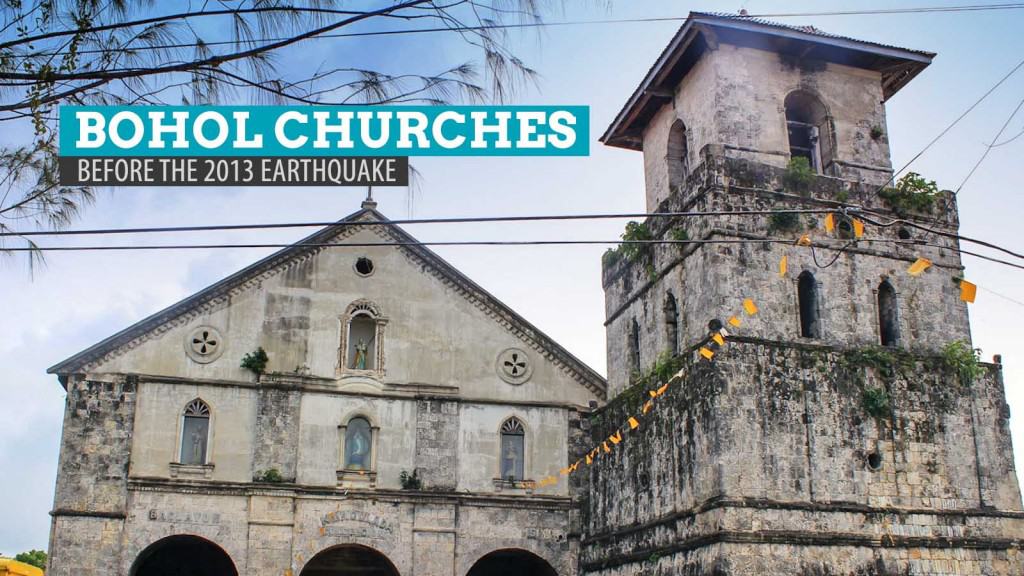Legend has it that some time during the Spanish era, pirates invaded the coastal town of Dauis, Bohol. The townsfolk locked themselves up in the church but it wasn’t long until they ran out of food and water. To their surprise, a well miraculously appeared near the altar of the church, which supplied them with water. The church was just yards from the shore but the water from the well was fresh, something the people could not explain. To this day, the well can be seen inside the church and still provides water, which many believe to have healing properties.
Stories of miracles like this make old churches in the Philippines more curious, more interesting, more charming. And it doesn’t even matter whether you believe them or not. Many locals believe them to be true and these “truths” add character and another dimension to the already fascinating history of these religious sites, which most often were the center of the town during the Spanish period.
Bohol is one of the oldest provinces in the Philippines. And you know what that means — old churches. There are around 30 major Catholic churches throughout the island province and many of them are centuries-old. Unfortunately, I didn’t have time to see all them as it wasn’t really the goal of this trip. I was touring my family around to see the most popular tourist sites in the island, mostly in the southeastern part, and my siblings wanted to see the churches, too. From Panglao Island to Chocolate Hills alone, we spotted and stopped at four remarkable churches that caught our attention.
Dauis Church (Our Lady of Assumption Church)
The legend I related above is the one that surrounds Dauis Church, the first of the four churches we visited that day. Dauis is one of only two municipalities in Panglao Island. It is on the side facing the main island of Bohol. Dauis Church is easily visible from the main island since it stands by the shore.
Dauis Church, more formally known as the Our Lady of Assumption Church, was founded by Fr. Diego de Ayala and Fr. Joseph Gregorio of the Jesuit order. But what we see today is the fifth church that has been constructed here. The first four were made of light materials and the present structure was built in 1863 under Rev. Fr. Julio Saldana.
I couldn’t figure out what was the dominant style of the church. Aside from the fact that I really know no zit about architecture, it was just confusing at first glance. That’s because they combined different styles. The top half looks neoclassical, the bottom half Romanesque (I think), and the tower Gothic. Some say there are also heavy Byzantine influences but I don’t see them. But then again, what do I know?
All I am sure of now is that the windows and the tower were giving me Hogwarts vibes during my visit.
Baclayon Church (Church of Our Lady of the Immaculate Conception)
Miracles are no stranger to neighboring Baclayon, either. The Baclayon Church is known for the mysterious images that appear on its walls. Today, there are two that blow the minds of tourists. On one of its buttresses is an image of the face of a man, which many claim to be Padre Pio of Pietrelcina, a Capuchin priest from Italy. The other miraculous image is on the wall near the museum entrance. The image is said to resemble the Virgin Mary with baby Jesus.
The site was formally founded by Fr. Juan de Torres and Fr. Gabriel Sanchez of the Jesuit order on November 17 1596, making it the oldest church in Bohol and one of the oldest in the Philippines. But it was in 1727 that the present building was erected by around 200 forced laborers who harvested coral stones from the sea. Although Jesuit-built, it was the Augustinian Recollects who installed a more modern facade to the church in the 19th century.
Baclayon Church also faces the sea. There’s a park right across it that provides a good view and a good place to relax and rejuvenate.
Loboc Church (The Church of San Pedro)
If you’ve been on a cruise in Loboc River, you probably have noticed this massive bridge that suddenly and absurdly stops right before an old building. If you’ve never been to Loboc before and you’re going to soon, don’t worry because you will not miss it. It’s an absurdity that cannot escape the eyes of tourists. The historic structure it was set to collide with is the Church of San Pedro, also known as Loboc Church. The bridge today is a tornado that froze right when it was just about to demolish the church. But that’s another story.
The Church of San Pedro is widely regarded as the second oldest in Bohol. The original church was built in 1602 but it fell to a disaster. The present church was built over 35 years later, in 1638. Loboc Church has two façades. On one side is Baroque, built at the time when the Jesuits had the power. On the other, a Neoclassical porch that was installed by the Recollects.
I’m not really a religious person. (Not at all.) But being religious is not a prerequisite to appreciating these four churches. In a province that is one of the first in the Philippines to embrace Christianity, these churches not only affected but perhaps even became the center of the lives of the people of these towns in the past centuries. While I regret not spending more time at each time, I am content with taking the time, no matter how brief, to stop, look, and admire these historic sites.
Posted: 2013 • 2 • 21
Note: The author does not necessarily believe in the miracles described in this post. Just sharing.
